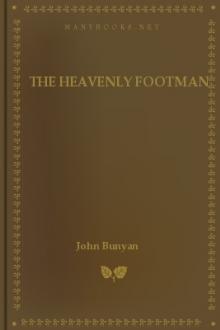The Children's Own Longfellow, Henry W. Longfellow [world best books to read TXT] 📗

- Author: Henry W. Longfellow
Book online «The Children's Own Longfellow, Henry W. Longfellow [world best books to read TXT] 📗». Author Henry W. Longfellow
[Illustration: PAUL REVERE'S RIDE Howard Smith
A voice in the darkness, a knock at the door ]
PAUL REVERE'S RIDE
Listen, my children, and you shall hear Of the midnight ride of Paul Revere, On the eighteenth of April, in Seventy-five; Hardly a man is now alive Who remembers that famous day and year.
He said to his friend, "If the British march By land or sea from the town to-night, Hang a lantern aloft in the belfry-arch Of the North Church tower as a signal light,-- One, if by land, and two, if by sea; And I on the opposite shore will be, Ready to ride and spread the alarm Through every Middlesex village and farm, For the country folk to be up and to arm."
Then he said, "Good night!" and with muffled oar Silently rowed to the Charlestown shore, Just as the moon rose over the bay, Where swinging wide at her moorings lay The Somerset, British man-of-war; A phantom ship, with each mast and spar Across the moon like a prison bar, And a huge black hulk, that was magnified By its own reflection in the tide.
Meanwhile, his friend, through alley and street, Wanders and watches with eager ears, Till in the silence around him he hears The muster of men at the barrack door, The sound of arms, and the tramp of feet, And the measured tread of the grenadiers, Marching down to their boats on the shore.
Then he climbed the tower of the Old North Church, By the wooden stairs, with stealthy tread, To the belfry-chamber overhead, And startled the pigeons from their perch On the sombre rafters, that round him made Masses and moving shapes of shade,-- By the trembling ladder, steep and tall, To the highest window in the wall, Where he paused to listen and look down A moment on the roofs of the town, And the moonlight flowing over all.
Beneath, in the churchyard, lay the dead, In their night-encampment on the hill, Wrapped in silence so deep and still That he could hear, like a sentinel's tread, The watchful night-wind, as it went Creeping along from tent to tent, And seeming to whisper, "All is well!" A moment only he feels the spell Of the place and the hour, and the secret dread Of the lonely belfry and the dead; For suddenly all his thoughts are bent On a shadowy something far away, Where the river widens to meet the bay,-- A line of black that bends and floats On the rising tide, like a bridge of boats.
Meanwhile, impatient to mount and ride, Booted and spurred, with a heavy stride On the opposite shore walked Paul Revere. Now he patted his horse's side, Now gazed at the landscape far and near, Then, impetuous, stamped the earth, And turned and tightened his saddle-girth; But mostly he watched with eager search The belfry-tower of the Old North Church, As it rose above the graves on the hill, Lonely and spectral and sombre and still. And lo! as he looks, on the belfry's height A glimmer, and then a gleam of light! He springs to the saddle, the bridle he turns, But lingers and gazes, till full on his sight, A second lamp in the belfry burns! A hurry of hoofs in a village street, A shape in the moonlight, a bulk in the dark, And beneath, from the pebbles, in passing, a spark Struck out by a steed flying fearless and fleet: That was all! And yet, through the gloom and the light, The fate of a nation was riding that night; And the spark struck out by that steed, in his flight, Kindled the land into flame with its heat.
He has left the village and mounted the steep, And beneath him, tranquil and broad and deep, Is the Mystic, meeting the ocean tides; And under the alders that skirt its edge, Now soft on the sand, now loud on the ledge, Is heard the tramp of his steed as he rides.
It was twelve by the village clock, When he crossed the bridge into Medford town. He heard the crowing of the cock, And the barking of the farmer's dog, And felt the damp of the river fog, That rises after the sun goes down.
It was one by the village clock, When he galloped into Lexington. He saw the gilded weathercock Swim in the moonlight as he passed, And the meeting-house windows, blank and bare, Gaze at him with a spectral glare, As if they already stood aghast At the bloody work they would look upon.
It was two by the village clock, When he came to the bridge in Concord town He heard the bleating of the flock, And the twitter of birds among the trees, And felt the breath of the morning breeze Blowing over the meadows brown. And one was safe and asleep in his bed Who at the bridge would be first to fall, Who that day would be lying dead, Pierced by a British musket-ball.
You know the rest. In the books you have read. How the British Regulars fired and fled,-- How the farmers gave them ball for ball, From behind each fence and farm-yard wall, Chasing the red-coats down the lane, Then crossing the fields to emerge again Under the trees at the turn of the road, And only pausing to fire and load.
So through the night rode Paul Revere; And so through the night went his cry of alarm To every Middlesex village and farm,-- A cry of defiance and not of fear, A voice in the darkness, a knock at the door, And a word that shall echo forevermore! For, borne on the night-wind of the Past Through all our history, to the last, In the hour of darkness and peril and need, The people will waken and listen to hear The hurrying hoof-beats of that steed And the midnight message of Paul Revere.
[Illustration: THE BUILDING OF THE LONG SERPENT
"Men shall hear of Thorberg Skafting For a hundred year!" ]
THE BUILDING OF THE LONG SERPENT
Thorberg Skafting, master-builder, In his ship-yard by the sea, Whistling, said, "It would bewilder Any man but Thorberg Skafting, Any man but me!"
Near him lay the Dragon stranded, Built of old by Raud the Strong, And King Olaf had commanded He should build another Dragon, Twice as large and long.
Therefore whistled Thorberg Skafting, As he sat with half-closed eyes, And his head turned sideways, drafting That new vessel for King Olaf Twice the Dragon's size.
Round him busily hewed and hammered Mallet huge and heavy axe; Workmen laughed and sang and clamored; Whirred the wheels, that into rigging Spun the shining flax!
All this tumult heard the master,-- It was music to his ear; Fancy whispered all the faster, "Men shall hear of Thorberg Skafting For a hundred year!"
Workmen sweating at the forges Fashioned iron bolt and bar, Like a warlock's midnight orgies Smoked and bubbled the black caldron With the boiling tar.
Did the warlocks mingle in it, Thorberg Skafting, any curse? Could you not be gone a minute But some mischief must be doing, Turning bad to worse?
'T was an ill wind that came wafting From his homestead words of woe; To his farm went Thorberg Skafting, Oft repeating to his workmen, Build ye thus and so.
After long delays returning Came the master back by night; To his ship-yard longing, yearning, Hurried he, and did not leave it Till the morning's light.
"Come and see my ship, my darling!" On the morrow said the King; "Finished now from keel to carling; Never yet was seen in Norway Such a wondrous thing!"
In the ship-yard, idly talking, At the ship the workmen stared: Some one, all their labor balking, Down her sides had cut deep gashes, Not a plank was spared!
"Death be to the evil-doer!" With an oath King Olaf spoke! "But rewards to his pursuer!" And with wrath his face grew redder Than his scarlet cloak.
Straight the master-builder, smiling, Answered thus the angry King: "Cease blaspheming and reviling, Olaf, it was Thorberg Skafting Who has done this thing!"
Then he chipped and smoothed the planking, Till the King, delighted, swore, With much lauding and much thanking, "Handsomer is now my Dragon Than she was before!"
Seventy ells and four extended On the grass the vessel's keel; High above it, gilt and splendid, Rose the figure-head ferocious With its crest of steel.
Then they launched her from the tressels, In the ship-yard by the sea; She was the grandest of all vessels, Never ship was built in Norway Half so fine as she!
The Long Serpent was she christened, 'Mid the roar of cheer on cheer! They who to the Saga listened Heard the name of Thorberg Skafting For a hundred year!
End of the Project Gutenberg EBook of The Children's Own Longfellow by Henry W. Longfellow
ImprintPublication Date: 12-02-2014
All Rights Reserved





Comments (0)